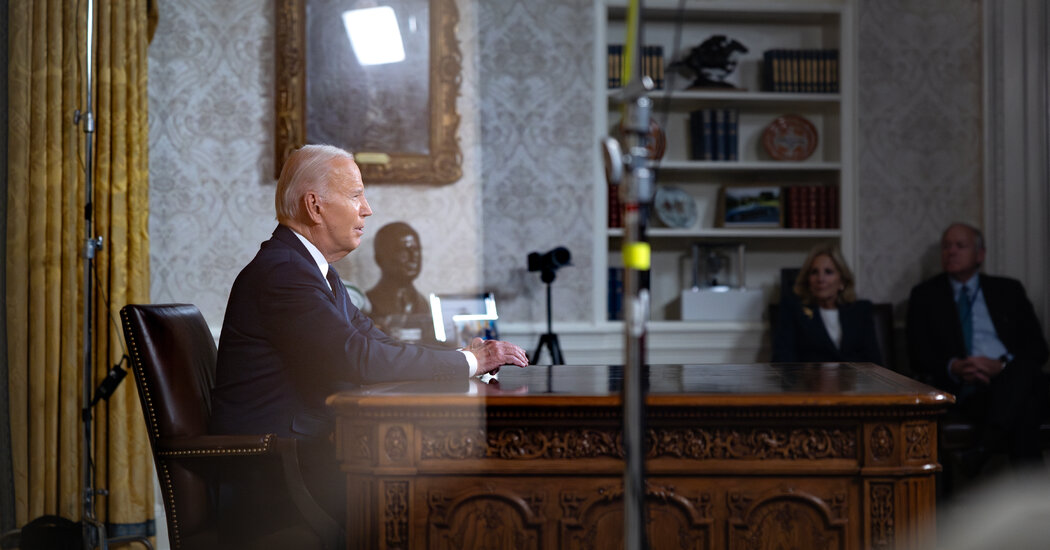Iguodala goes from the hardwood to the boardroom
For nearly two decades, Andre Iguodala established a reputation as one of the N.B.A.’s most versatile players, an All-Star and Olympic gold medalist who racked up four championships with the Golden State Warriors.
Now, Iguodala has told DealBook exclusively that he is retiring from pro basketball to focus on his other career: start-up investor. He will run Mosaic, a $200 million venture capital fund that he just raised with his longtime business partner, Rudy Cline-Thomas.
Iguodala’s disclosure ends years of speculation. The 39-year-old had suggested that last year’s season would be his last, only to shoot down rumors about it earlier this year. But now is the time to hang up his sneakers. “It’s been a blessing to play for that long,” he told DealBook. (He hasn’t fully come to grips with it yet: “I don’t know if it’s actually hit me yet,” he said.)
He’s embracing his next act. Though he and Cline-Thomas had begun buying tech stocks in 2010, the two dived deeply into start-ups when he joined the Warriors in 2013. “When I initially went out to the Bay Area, it was my intent to have success on and off the court,” Iguodala said. “I thought about how to get access.”
That led to meetings with venture capital firms like Andreessen Horowitz, and then to taking stakes in start-ups, including Zoom and the cybersecurity provider Cloudflare.
It is a model now followed by many pro athletes, from the N.F.L.’s Patrick Mahomes and Aaron Rodgers to Iguodala’s longtime Warriors teammate Steph Curry. “Athletes are becoming smarter and smarter,” Iguodala said, asserting that their competitiveness and an ability to speak to audiences help to sell and scale products.
Mosaic is now his focus. The firm will home in on seed- and early-stage investments in enterprise software, fintech health care and sports companies. Iguodala and Cline-Thomas closed Mosaic’s first fund — whose investors included endowments, institutions and founders of companies they have already backed — in May.
Mosaic’s investments include Vessel, a builder of modular multifamily homes, and Athletes First, an N.F.L. talent agency and management firm.
Sports franchise ownership is another focus. Iguodala is a co-owner of Leeds United, an English soccer club; Bay Area F.C., the National Women’s Soccer League team; and, along with former teammates Curry and Klay Thompson, the San Francisco branch of TGL, the upstart golf league co-founded by Tiger Woods and Rory McIlroy.
Iguodala’s highest aspiration? Owning an N.B.A. team. “The timing has to be right,” he said, but “that’s definitely the ultimate goal.”
“The disruption to an already difficult business model is real. … This is a post-social web.”
— Adrienne LaFrance, executive editor of The Atlantic. Media executives have come to the realization that traffic to their websites from tech giants like Google and Meta’s Facebook is in sharp decline, and probably won’t rebound.
A new push for net neutrality
The Federal Communications Commission has revived a plan to restore so-called net neutrality rules, reigniting a fight over how Washington regulates internet services and whether the web should be treated as a utility.
The Democrat-led agency voted along party lines. Commissioners voted 3-2 to revive Obama-era regulations that prohibited broadband providers, such as Comcast, Charter Communications and AT&T, from blocking or slowing down services like Google and Netflix that compete with them. The Trump administration had repealed the rules, saying they were an example of regulatory overreach.
The rules let the F.C.C. treat the internet like a utility, like a water or electricity provider. Jessica Rosenworcel, chair of the F.C.C., said the importance of internet access was illustrated during the Covid pandemic. Broadband access became a necessity for work and education but the regulator was unable to police providers to ensure quality service, she said.
The agency will be able to monitor the companies for net-neutrality violations, consumer harm and security lapses. This could include forcing internet providers to lower rates that the F.C.C. deems unreasonable.
Republicans and the cable companies vowed to fight the move. Brendan Carr, a Republican F.C.C. commissioner, said the rules were counterproductive and that internet service had improved for consumers when the rules weren’t in place.
USTelecom, a cable industry trade group, warned of “mission creep” by the F.C.C. into cybersecurity. Internet providers said they would challenge the policy change, including through lawsuits all the way up to the Supreme Court.
THE SPEED READ
Deals
-
Video game publishers are sitting on $45 billion in cash, potentially fueling more consolidation in the industry after Microsoft closed its $69 billion takeover of Activision Blizzard. (CNBC)
-
Thrive Capital, the venture capital firm led by Josh Kushner, is reportedly leading talks to buy shares of OpenAI at a valuation of more than $80 billion. (The Information)
-
U.S. banking giants have shed a combined 20,000 jobs so far this year. (CNBC)
-
Investors in the U.S. and Europe have sold $5.1 billion worth of shares in major Chinese tech companies, including Alibaba and Tencent, over the past two months. (Bloomberg)
Policy
-
The S.E.C. will drop lawsuits against two crypto executives over trading of the digital token XRP. (WSJ)
-
Mike Huckabee, the former Arkansas governor, is the latest author to sue tech companies including Meta and Microsoft, for training A.I. tools on their published works without compensation. (The Verge)
-
Was Peter Thiel a confidential F.B.I informant? (Insider)
Best of the rest
We’d like your feedback! Please email thoughts and suggestions to dealbook@nytimes.com.


